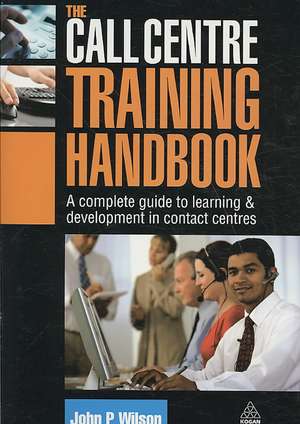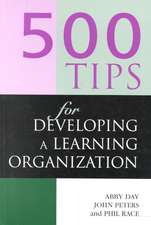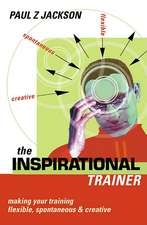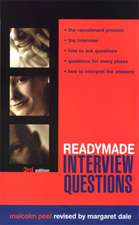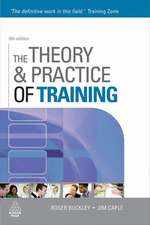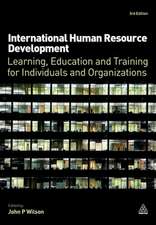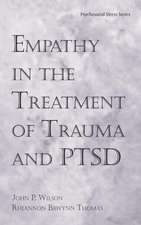The Call Centre Training Handbook – A Complete Guide to Learning and Development in Contact Centres
Autor John P. Wilsonen Limba Engleză Hardback – 2 dec 2008
The Call Centre Training Handbook is a complete resource for providing learning, training and development within contact centers. Whether for induction or for periodic training, those who train staff will find it a valuable resource. It also offers call center managers and trainers information with which to benchmark training and identifies best practice in learning and development.
The book addresses the key areas of training call center staff including: quality of customer service, dealing with difficult customers, outsourcing and offshore training, and measuring and evaluating performance. International case studies provide the reader with practical examples of real-life training, while sample exercises and models supply the tools to deliver effective learning.
The book addresses the key areas of training call center staff including: quality of customer service, dealing with difficult customers, outsourcing and offshore training, and measuring and evaluating performance. International case studies provide the reader with practical examples of real-life training, while sample exercises and models supply the tools to deliver effective learning.
Preț: 471.17 lei
Nou
Puncte Express: 707
Preț estimativ în valută:
90.17€ • 97.91$ • 75.74£
90.17€ • 97.91$ • 75.74£
Carte tipărită la comandă
Livrare economică 22 aprilie-06 mai
Preluare comenzi: 021 569.72.76
Specificații
ISBN-13: 9780749450885
ISBN-10: 0749450886
Pagini: 336
Dimensiuni: 163 x 242 x 28 mm
Greutate: 0.64 kg
Editura: Kogan Page
ISBN-10: 0749450886
Pagini: 336
Dimensiuni: 163 x 242 x 28 mm
Greutate: 0.64 kg
Editura: Kogan Page
Cuprins
1. The big picture: learning, training and development in contact centres
Introduction; The need for learning and development; Defining a call/contact centre; The development of call/contact centres; Drivers of learning and development; Barriers to learning, training and development; The labour market and employment; The labour market and call centres; Building a positive reputation; Outsourcing and offshoring; Supporting regeneration through training and development; The customer service imperative; Stress; Conclusion
2. Structuring learning and development
Introduction; Supporting organizational objectives; Customer service and training strategy; Responsibility for training; A deskilled occupation?; A skilled occupation; Content areas and forms of delivery; Marketing and promoting training and development; In-house training or outsourced?; Training duration; Training as motivation; Contact centres as learning organizations; Conclusion
3. Skills and competencies
Introduction; Call centre skills; The range of skills; Qualifications; The e-skills contact centre career and skills framework; Skills and employability; Conclusion
4. Recruiting, inducting and socializing new employees
Introduction; Recruiting and selecting; Qualifications; Attitude; Induction; Socialization; Conclusion
5. Communicating and connecting with the customer
Introduction; Theories of communication; Communicating effectively; Sounding right – the aesthetics of spoken language; Spoken communication; Communication skills training; Written communication; Transition from a call centre to a contact centre; Conclusion
6. Delivering excellent customer service
Introduction; Price versus service; Customer satisfaction; Customizing service through attitude training; Customer service techniques; Understanding customers; Handling abusive customers; Conclusion
7. Coaching and mentoring
Introduction; Coaching/mentoring; Stages in the coaching process; Trust; Committing to action; Giving feedback; Types of coaching; Conclusion
8. System skills training Christine Cross and Anthony Brennan
Introduction; The learning cycle; Learning styles; Principles of adult learning; The training cycle; Tips for the trainer; Conclusion
9. Management development in call centres Giles McClelland and Robert Hale
Introduction; What is management?; The importance of strong management; Management ability and contemporary issues in call centres; Different types of call centre management qualifications; Management in the learning company; Developing extraordinary management in the learning company; Conclusion
10. Developing emotional intelligence and managing stress
Introduction; Working in call centres; Emotional labour; The development of emotional intelligence; Using emotional intelligence in call centres; Emotional contagion and remaining positive; Handling stress; Transactional analysis; Conclusion
11. Managing international cross-cultural communications Declan Mulkeen, William Resch and Eugene Piccinini, Communicaid
Introduction; Where are we now?; Communication challenges in offshore call centres; Base language challenges; Training solutions; Empathy: the missing 1 per cent; Emotional intelligence; Cultural intelligence; Linguistic competence; Is there a solution?; Conclusion
12. Managing and evaluating performance
Introduction; Performance management; Measuring quantity; Quantity versus quality; The impact of training; Personal development plans; Valuing people and performance; Levels of training evaluation; Monitoring employees; Conclusion
Introduction; The need for learning and development; Defining a call/contact centre; The development of call/contact centres; Drivers of learning and development; Barriers to learning, training and development; The labour market and employment; The labour market and call centres; Building a positive reputation; Outsourcing and offshoring; Supporting regeneration through training and development; The customer service imperative; Stress; Conclusion
2. Structuring learning and development
Introduction; Supporting organizational objectives; Customer service and training strategy; Responsibility for training; A deskilled occupation?; A skilled occupation; Content areas and forms of delivery; Marketing and promoting training and development; In-house training or outsourced?; Training duration; Training as motivation; Contact centres as learning organizations; Conclusion
3. Skills and competencies
Introduction; Call centre skills; The range of skills; Qualifications; The e-skills contact centre career and skills framework; Skills and employability; Conclusion
4. Recruiting, inducting and socializing new employees
Introduction; Recruiting and selecting; Qualifications; Attitude; Induction; Socialization; Conclusion
5. Communicating and connecting with the customer
Introduction; Theories of communication; Communicating effectively; Sounding right – the aesthetics of spoken language; Spoken communication; Communication skills training; Written communication; Transition from a call centre to a contact centre; Conclusion
6. Delivering excellent customer service
Introduction; Price versus service; Customer satisfaction; Customizing service through attitude training; Customer service techniques; Understanding customers; Handling abusive customers; Conclusion
7. Coaching and mentoring
Introduction; Coaching/mentoring; Stages in the coaching process; Trust; Committing to action; Giving feedback; Types of coaching; Conclusion
8. System skills training Christine Cross and Anthony Brennan
Introduction; The learning cycle; Learning styles; Principles of adult learning; The training cycle; Tips for the trainer; Conclusion
9. Management development in call centres Giles McClelland and Robert Hale
Introduction; What is management?; The importance of strong management; Management ability and contemporary issues in call centres; Different types of call centre management qualifications; Management in the learning company; Developing extraordinary management in the learning company; Conclusion
10. Developing emotional intelligence and managing stress
Introduction; Working in call centres; Emotional labour; The development of emotional intelligence; Using emotional intelligence in call centres; Emotional contagion and remaining positive; Handling stress; Transactional analysis; Conclusion
11. Managing international cross-cultural communications Declan Mulkeen, William Resch and Eugene Piccinini, Communicaid
Introduction; Where are we now?; Communication challenges in offshore call centres; Base language challenges; Training solutions; Empathy: the missing 1 per cent; Emotional intelligence; Cultural intelligence; Linguistic competence; Is there a solution?; Conclusion
12. Managing and evaluating performance
Introduction; Performance management; Measuring quantity; Quantity versus quality; The impact of training; Personal development plans; Valuing people and performance; Levels of training evaluation; Monitoring employees; Conclusion
Notă biografică
John P. Wilson is a consultant and researcher and holds positions at Oxford, Sheffield and Bradford Universities, UK. He is the editor of Human Resource Development and author of Experiential Learning (both published by Kogan Page). He is also Director of the EU Commission project Call Centre Training and Knowledge Transfer.
Descriere
A complete resource for providing learning, training, and development within contact centers. This handbook offers call center managers and trainers information with which to benchmark training and identifies best practice in learning and development.
